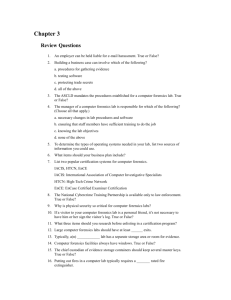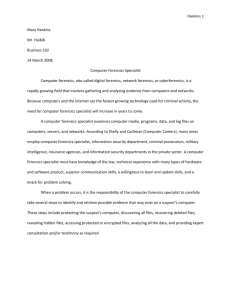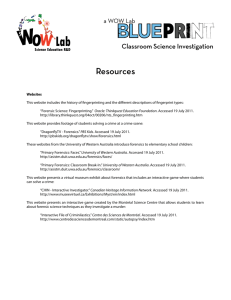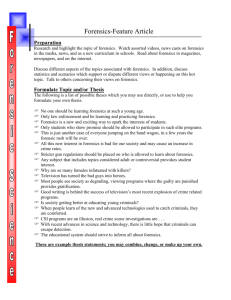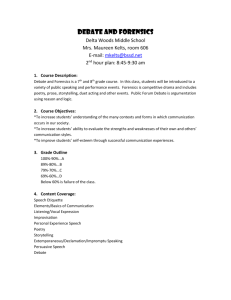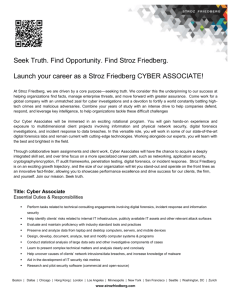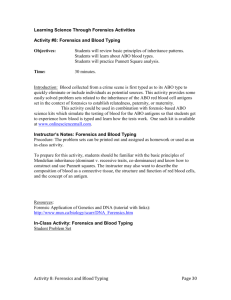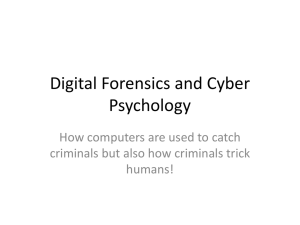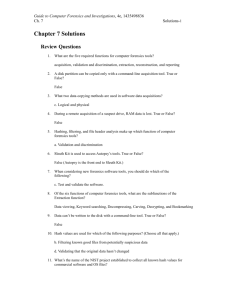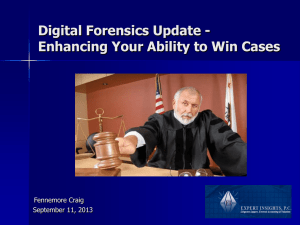Final - Utah Valley University
advertisement
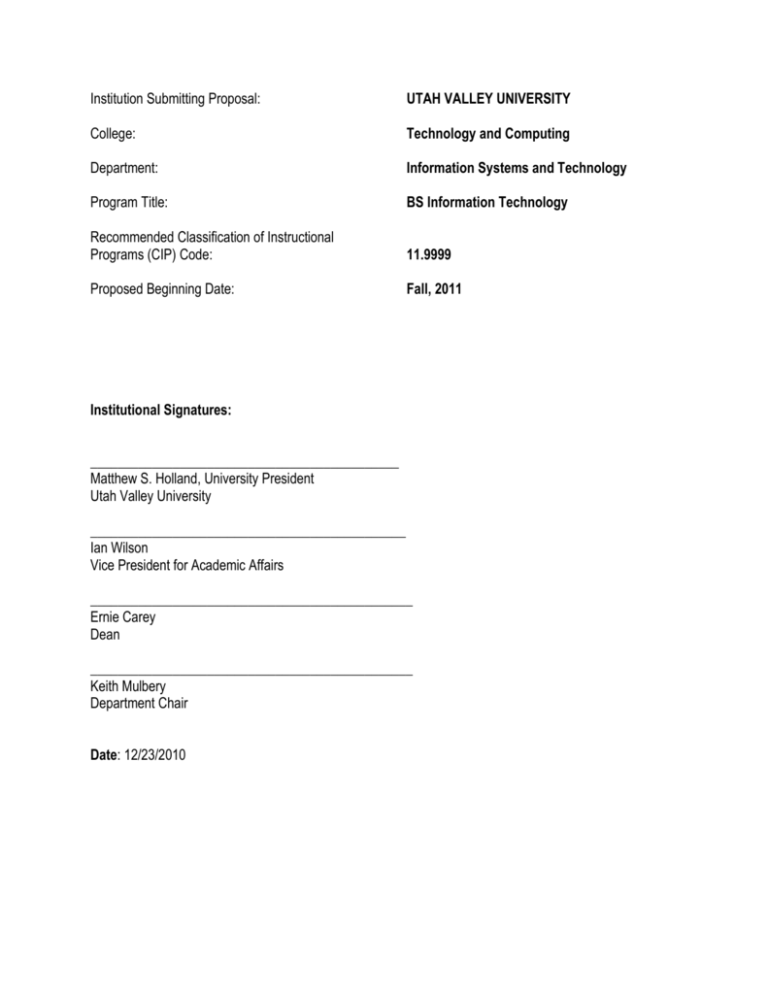
Institution Submitting Proposal: UTAH VALLEY UNIVERSITY College: Technology and Computing Department: Information Systems and Technology Program Title: BS Information Technology Recommended Classification of Instructional Programs (CIP) Code: 11.9999 Proposed Beginning Date: Fall, 2011 Institutional Signatures: _____________________________________________ Matthew S. Holland, University President Utah Valley University ______________________________________________ Ian Wilson Vice President for Academic Affairs _______________________________________________ Ernie Carey Dean _______________________________________________ Keith Mulbery Department Chair Date: 12/23/2010 Section I: Request The Information Systems and Technology (IS&T) department at Utah Valley University would like to propose the addition of one new emphasis and the discontinuation of two emphases within the existing Bachelor of Science (BS) in Information Technology (IT) degree effective Fall, 2011. Emphases to be discontinued include Web Administration and Security and Database Administration and Security. The emphasis to be added is Computer Forensics and Security. This action was approved by the UVU Board of Trustees on December 9, 2010. Section II: Need The current BS in Information Technology degree has three areas of emphasis. The proposal to discontinue two emphases and add one emphasis will enable faculty to better allocate resources among subjects in demand. In particular, the trend in IT is to focus on computer forensics and security. While Web and Database administration are important in IT, today’s graduates need more specialized training in computer forensics and security. Through information surveys and discussions, current two- and four-year students in Information Technology programs at UVU have expressed interest in a Computer Forensics emphasis option. The IS&T Department Advisory Board also supports the Computer Forensics emphasis. The Web Administration and Database Administration emphases are being removed due to low enrollments and to better align efforts around student interests and current trends in the field of IT. The proposed emphasis offers the courses required for both ABET (IT Accrediting body) and FEPAC (Forensics Accrediting body) should the IS&T department decide to pursue these accreditations. Students completing the program will have taken courses in Information Technology, Information Systems, Criminal Justice, Forensic Science, Computer Science, and Digital Media. This unique blend of existing courses will provide a solid foundation for employment in government or in the IT or computer forensic areas. Section III: Institutional Impact The proposed changes should not negatively affect the enrollments of any affiliated departments or programs of other institutions. Moreover, because the proposed emphasis is cross-departmental, it should have a positive impact on enrollments within courses in other departments. The proposed emphasis will not affect any existing administrative structures, nor will additional changes in faculty or staff be required. Section IV: Finances No new funds are required to institute the proposed emphases. The necessary equipment, to be used in courses in the IT program, has already been purchased. Appendix A: New Courses Prefix & Number IT 3540 IT 4700 IT 4750 IT 4800 Title Mac OS and Server Support Secure Server Administration Network Security and Operations Capstone Advanced Computer Forensics Credit Hours 3 3 3 3 IT 3540 Mac OS and Server Support 3.0:3.0:0.0 Provides an in-depth exploration of the Mac OS X, and provides the skills to troubleshoot and correct problems that may arise by users. Teaches installation and configuration of a Mac OS X Server. Involves implementing and maintaining a Mac server in a network, including file sharing, mail, web, and wikis. IT 4700 Secure Server Administration 3.0 : 3.0 : 0.0 Prerequisite(s): IT 3510, IT 3540, IT 3600, IT 3700 Studies the latest techniques used to secure servers from outside attacks. Teaches students how to scan, test, hack and secure their own systems. Contains several hands-on intensive labs designed to give students practical experience with current essential security systems. Teaches students how perimeter defenses work and how to monitor their own system. Includes how intruders escalate privileges and what steps can be taken to secure a system. Examines Intrusion Detection Systems (IDS), policy creation. Social engineering, DDoS attacks, buffer overflows and virus creation. IT 4750 Network Security and Operations Capstone 3.0 : 3.0 : 0.0 Prerequisite(s): IT 3600 and INFO 3700 Designed to give all networking professionals a better understanding of how the networking function is managed, the roles that various professionals play, and the key issues involved in coordinating and monitoring networking activities. Examines what network managers do and how they do it, specifically -operations, financial, risk, and business continuity management. Examines the fit between network systems and corporate strategy. Includes the procurement process; the use of Service Level Agreement for managing both external and internal services; the application of financial analysis and decision-making approaches to aid network investment decisions at the operational, project, tactical and strategic levels and manage capital budgets, acquisition of hardware, personnel, and professional services at project and system levels; network project risk assessment-management-contingency planning; business continuity and disaster recovery strategies and management. IT 4800 Advanced Computer Forensics 3.0 : 3.0 : 0.0 Prerequisite(s): IT 2800 or CJ 3800 (IT 3540 recommended) A continuation of IT 2800. Teaches students about additional devices that can store digital information. Exposes students to devices such as cell phones, PDAs, MP3 players, digital camera/camcorders, and network servers. Includes a complete lab investigation of one or more digital media through image acquisition, data recovery, and assembly of a final written report of findings. Requires participation in at least one mock deposition or trial testimony and cross examination. Includes weekly written papers covering topics in the field of digital forensics.
